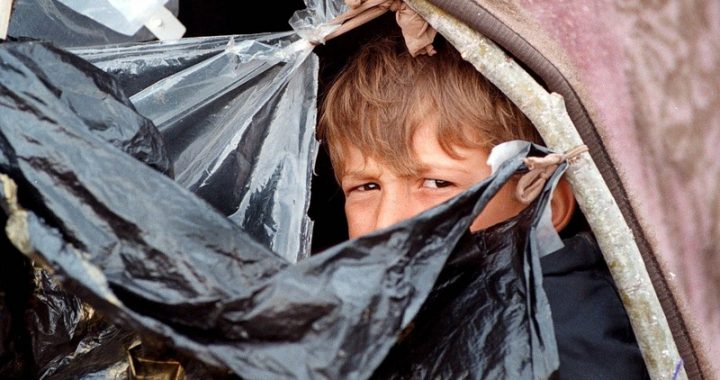“When they come, we always have one empty chair,” Majstorovic says.


 An ethnic Albanian refugee child in a makeshift tent made in Blace, North Macedonia in April 1999. Photo: EPA/FEHIM DEMIR.
An ethnic Albanian refugee child in a makeshift tent made in Blace, North Macedonia in April 1999. Photo: EPA/FEHIM DEMIR.
Stories of children who were killed or went missing during the 1998-99 Kosovo war are told in a newly-published book, ‘Hijacked Childhood’, in an attempt to address the traumas of war and promote peace.
A new book entitled ‘Hijacked Childhood’ was published on Tuesday, containing interviews with 12 parents who lost their children during the 1998-99 war in Kosovo and in its intermediate aftermath, offering a powerful chronicle of the traumas that they suffered.
In the book, published by ForumZFD in Kosovo, an NGO that focuses on dealing with the past in the western Balkans, the stories are presented in an oral history format and are illustrated with photos of the children and their belongings including school bags, clothes, notebooks, pencils, crayons, rulers, toys and diaries.
Korab Krasniqi of ForumZFD, who led the project, said that the book provides a better understanding of the parents’ lives and experiences and gives an opportunity to address wartime violence and trauma “as a way to engage in peacebuilding”.
“They express dissatisfaction because they didn’t have the opportunity to do more to save those who were killed or went missing from their families and they are asking for nothing more than justice, rehabilitation and recognition for those who are no longer with us,” Krasniqi said.
In the book, Ajete Ahmeti recalls how her ten-year-old son Jeton was shot dead by Serbian forces when they attacked her village, Kutllovc/Kutlovac, in May 1999.
Her relatives and neighbours fled into a forest to seek safety in the nearby village of Rashan, but she refused to accept that her son was dead and leave his body behind.
“In order to reach the village Rashan, my brother-in-law said, ‘Ajete let go of Jeton! He is dead. I am afraid that they will catch us all alive,’” Ahmeti says in the book.
“But I couldn’t let go of him, I said, ‘I can’t, he is still alive.’ I thought that he was still breathing,” she adds.
Most of the children whose stories are told in the book were killed within a period of three months in the spring of 1999 by the Yugoslav Army and Serbian security forces after NATO began its air campaign against Slobodan Milosevic’s regime, while some others went missing after the war officially ended in June 1999.
In the book, the parents explain that they continue to be tormented by the feeling that there was never any real justice for the crimes that were committed against their children.
“I want to find the truth, in order to find peace,” says Dragica Majstorovic, who lost her son Ivan in August 1999 while they, like many other Serbs, were trying to flee from Kosovo.
The 16-year-old was abducted while they were heading for Leskovac in Serbia, where he was due to start high school, taken away to an unknown location and never seen again.
In the book, she explains how her son still appears to her in her dreams.
“He tells me, ‘I ran away, but I don’t know where to go.’ Or I dream that I am looking for him in a cemetery, and he comes and tells me, ‘I’m not dead. How long are you going to look for me in cemeteries, we have to move on. Let’s move on,” Majstorovic says.
Almost all the parents interviewed have named children or grandchildren born since the war after the children they lost.
They also explain how the most difficult times of year are on festive holidays.
“When they come, we always have one empty chair,” Majstorovic says.
30 August 2022 - 15:22

Journalistic documentation of Kosovo’s civil resistance in the 1980s...

A Pristina court for a second time found Muhamet Alidemaj, a former Se...

As part of its second Reporting House museum, BIRN is chronicling the ...

Kosovo marked the 27th anniversary of the Recak massacre honoring the ...